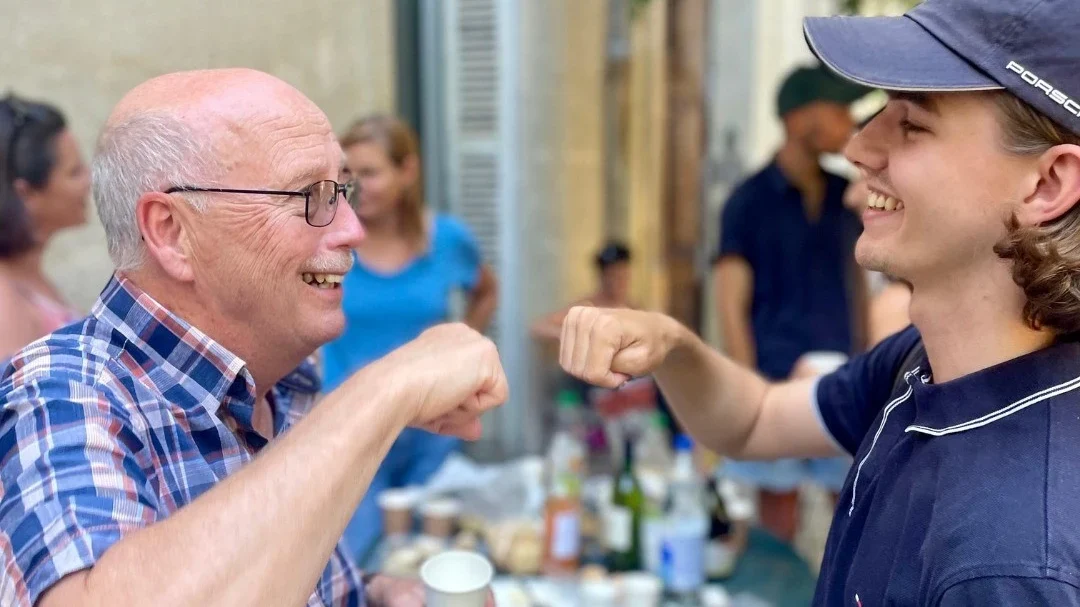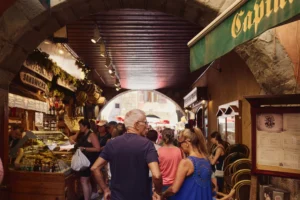It’s Never Too Late to Speak the Language of Your Dreams
Reflections from a lifelong language learner and course organiser
I’ve always loved languages. Not just learning them myself although I’ve done that passionately for years but helping others discover the magic of speaking a new tongue. Over the last decade, I’ve had the chance to organise many language courses for adults and seniors, especially in France. And each time, I’ve witnessed something extraordinary: the spark in someone’s eyes when they order a coffee in a foreign language for the first time. The joy of understanding a joke in class. The pride of realizing, “I can do this.”
Now, let me tell you something right away. I don’t really like the term “senior.” We use it because it’s common, but to me, it often misses the point. I’m 62 years old myself and I don’t feel “senior” at all. I’m still eager to learn, to travel, to discover, to be surprised by people and languages. And that’s exactly what lifelong learning is about. Staying curious, staying open, and never letting a number define who you are.
The people I’ve met in these so-called “senior” programs are some of the most vibrant, curious, and motivated learners I’ve ever seen. And that’s what this article is really about.
Why seniors are Quietly the best language learners
There’s something incredibly powerful about learning when you’re doing it just for yourself. Not for a job, not for a grade, but for the pleasure of it. Seniors arrive in class with life experience, curiosity, and a real desire to connect. They listen deeply, they ask thoughtful questions, and they’re not afraid to laugh at their mistakes. That makes them incredible language learners.
I’ve seen senior learners light up during a market visit, try out new phrases with locals at a bakery, and share laughter in class when someone invents a new word by accident. These are moments of joy that no textbook can offer.
If you’re new to French or want a boost before joining a course, these essential tips for beginners can give you a head start.
What makes a good French course for seniors
From my years of organising French language programs, I’ve learned that seniors don’t need special lessons. They need meaningful ones.
A good senior friendly French course is:
• Well paced but never dull
• Rich in cultural discovery such as museums, food, and real-life situations
• Full of human connection both in class and outside
Comfort and support matter, yes. But so does inspiration. The best programs make space for both.
Want to understand how long progress might take to learn French ? Here’s a guide on how long it takes to learn French.
Why Age Diversity Is a Gift Not a Problem
Now let me be honest about something I hear often. Many seniors say, “I want a course where the other students are all my age.” I understand that instinct. It feels safer. More comfortable.
But after all these years, I can say this with certainty. Only learning with other seniors is not always the best option.
Why? Because language learning thrives on diversity not just cultural, but generational. I’ve seen time and time again how mixed-age classrooms bring out the best in everyone.
• Seniors bring patience, stories, and depth
• Younger learners bring energy, spontaneity, and playfulness
• The combination brings something truly special
Debates become richer. Humor flows more naturally. Unexpected friendships form. I’ve seen 65 year-olds and 22 year olds share drinks after class, help each other with vocabulary, and stay in touch for years. One French learner told me, “I came to learn a language, but I found a little family.”
The truth is, motivation has no age. Whether you’re 25 or 70, if you’re in that classroom, it’s because you want to be. And that shared motivation creates a bond stronger than age.
That’s why I always say, being part of a senior program doesn’t mean being surrounded only by seniors. It means being young at heart, open to meeting others, sharing perspectives, and laughing together.
Where to Go? (No, Not Everywhere — Just the ones that really work)
Since I’ve spent years working in language travel, people often ask me, “Where should I go to learn French in France?”
Well, I’ll be honest. I could list a dozen cities, but when it comes to senior learners, I believe some places work better than others. Based on what I’ve seen in and outside the classroom, here are my top three picks:
Annecy

A peaceful lakeside town in the Alps, perfect for anyone who enjoys fresh air, nature, and a calm rhythm. It’s a fantastic setting for combining language study with a true sense of well-being. Many learners enjoy staying with a host family or in a comfortable residence during their time in Annecy. And beyond the classroom, the city offers cultural activities that make learning feel alive — from lake cruises to food tastings and guided local visits.
Bordeaux

Sophisticated yet down to earth, Bordeaux blends excellent food and wine with rich history and elegant architecture. The city centre is beautifully preserved and easy to explore on foot. Whether you prefer a homestay or a private apartment, accommodation options in Bordeaux are designed to suit all levels of comfort and independence. Outside of class, the cultural program includes wine tastings, museum visits, and plenty of chances to use your French in real-life settings.
Lyon

For those who want to dive deep into French culture, Lyon is an ideal choice. It’s authentic, historical, and famously food loving — and very easy to live in, especially for longer stays. Learners can choose from a variety of places to stay in Lyon, and enjoy a well-rounded cultural experience that goes beyond language: think cooking workshops, theatre outings, and walking tours through the city’s rich architectural heritage.
Now, I have to confess. My colleagues in Toulouse and Montpellier probably won’t be thrilled to read this and I know they’d disagree with me. Their cities are wonderful in many ways, especially for younger learners and summer camps looking for sunshine, nightlife, or a more dynamic pace.
Check out places to stay in Montpellier
But when it comes to the comfort, rhythm, and cultural experience that senior learners usually appreciate most, Annecy, Bordeaux, and Lyon are the ones I’ve seen work best again and again.
And at the end of the day, that’s what matters. Finding a place where you feel welcomed, inspired, and at ease.
A Personal Invitation
So if you’re over 50 or 60 or 70 and wondering whether it’s too late to start learning French, let me reassure you. It’s not. In fact, it might be the perfect time.
You don’t need perfect grammar. You don’t need to keep up with anyone. You just need curiosity and the courage to try.
Because the truth is, lifelong learners don’t grow old. They grow curious.
And in my experience, those who start later often enjoy it the most.
Frequently Asked Questions
Can beginners over 50 start learning French from scratch?
Absolutely. Many of our senior learners begin with no prior knowledge. Courses are designed to make those first steps simple, welcoming, and focused on real conversation. You’ll start speaking and understanding within just a few days.
What type of accommodation is best for older adults?
That depends on your comfort and preferences. Many learners enjoy the connection and daily practice offered by a host family. Others prefer the independence of a studio, aparthotel, or residence. We offer several options in Annecy, Bordeaux, and Lyon to suit every lifestyle.
What are the benefits of learning a new language later in life?
Learning French at 60 or beyond can boost memory, support brain health, and increase emotional well-being. It provides purpose, structure, and joy — and many learners find it deeply motivating and socially enriching.
How long should I stay to make real progress?
While one-week courses are available, most seniors choose to stay for two to four weeks. This gives time to settle in, connect with others, and experience both the language and the local culture in a relaxed, fulfilling way.




